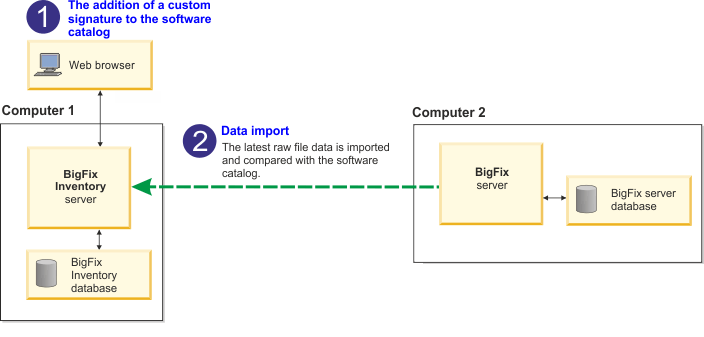Software discovery process after customizing the catalog
Software matching your catalog customizations can be identified in one of the below ways depending on the custom signature.
- Case 1: Common executable files or other popular file types
-
If you create a custom template signature based on any file or package data, or a custom signature of Package or File type, which is based on package data or file data, such as common executable files, then you need to run a data import to pull the latest scan data from the BigFix server. The new data is compared with the latest catalog and the updated software inventory is displayed in the web user interface.

The popular file extension list includes the following file types: *.exe, *.sys, *.com, *.ear, *.ocx, *.sh, *.bin, *.pl, *.ear, *.SH, *.BIN, *.PL, and *.EAR.
When you create signatures based on these file types, the custom content version of the software catalog remains the same, because no new catalog is created. The data is pulled from your endpoints and matched against the signatures on the server side. The same happens with template signatures including any file extension so such signature will work only if this file is listed on Scanned File Data panel.
- Case 2: Non-standard file types
- If you added new software signatures to the software catalog and those signatures are based on files other than common executable files, you must either wait until all the following steps in the catalog data flow complete or perform those steps yourself.
 When you create signatures based on non-standard file types, the custom content version of the software catalog changes, because the new catalog is created and distributed to your endpoints. The catalog with the new signatures is matched against the data on your endpoints.Note: The above scenario does not apply to template signatures. For more information, see Scanned File Data.
When you create signatures based on non-standard file types, the custom content version of the software catalog changes, because the new catalog is created and distributed to your endpoints. The catalog with the new signatures is matched against the data on your endpoints.Note: The above scenario does not apply to template signatures. For more information, see Scanned File Data.